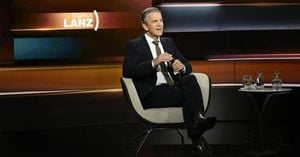Mercedes-Benz, the renowned Stuttgart-based carmaker, has released its quarterly figures for the first quarter of 2025, revealing a significant decline in both profits and revenue. The company reported that its profit fell by nearly 43 percent to 1.73 billion euros, down from 3.03 billion euros in the same period last year. Revenue also took a hit, dropping by 7 percent to 33.2 billion euros, slightly missing market expectations of 34.0 billion euros.
In terms of operating performance, earnings before interest and taxes (EBIT) decreased substantially, falling almost 41 percent to 2.29 billion euros, which also fell short of analysts' expectations of 2.54 billion euros. The adjusted EBIT margin for the passenger car segment shrank by 1.7 percentage points to 7.3 percent, although this was a smaller decline than analysts had anticipated.
The company has attributed part of this downturn to the ongoing trade tensions and tariff fluctuations imposed by President Donald Trump. Mercedes-Benz warned that these US import duties could have a significant impact on profits this year. "The current tariff fluctuations are too high to reliably assess business development this year," the company stated, emphasizing the uncertainty surrounding the demand for its vehicles.
Harald Wilhelm, CFO of Mercedes-Benz, expressed a cautious optimism, stating, "With the new CLA, our multi-year product and technology offensive begins. This new model brings fresh momentum while the demand for our current portfolio maintains our leadership position in the top-end segment, even in China." Wilhelm highlighted the company’s solid financial foundation, with net liquidity in the industrial business rising to 33.3 billion euros at the end of the quarter, up from 31.4 billion euros at the end of 2024.
Despite the challenges, the Free Cash Flow in the industrial business was a positive surprise, amounting to 2.36 billion euros, exceeding market expectations. The company confirmed its forecast for 2025, expecting a slightly lower revenue development compared to last year, alongside a significantly lower EBIT and Free Cash Flow in the industrial sector.
Market reactions to the quarterly results have been mixed, with the Mercedes-Benz share price declining by 1.7 percent to 53.60 euros shortly after the announcement. This drop reflects ongoing volatility in the automotive sector, heavily influenced by news from the United States. Analysts have expressed concerns over the potential impact of tariffs, noting that the company's profitability could suffer significantly if the current trade policies remain in place.
Philippe Houchois, an analyst at Jefferies, interpreted the company’s outlook statements as a withdrawal from previous forecasts, while Patrick Hummel from UBS echoed similar sentiments, praising the strong cost discipline within the passenger car division.
The situation in China, where demand for cheaper electric vehicles is rising, has also posed challenges for Mercedes-Benz. Sales in China fell by 10 percent, further contributing to the overall decline in revenue. The company has acknowledged that it is not well-positioned in the rapidly evolving electric vehicle market in China, where local manufacturers are gaining ground.
In the US market, since the introduction of a 25 percent tariff on car imports, sales have also seen a downturn. The company reported a 4 percent decline in group revenue during the first three months of the year compared to the same period last year, with an 8 percent drop in the passenger car segment. Conversely, the smaller van business experienced a 6 percent increase in revenue, highlighting a stark contrast between the segments.
Looking ahead, the company has reiterated its commitment to targeted investments in product innovation and software architecture, particularly in key markets like China and the USA. This strategy aims to secure the brand's competitiveness in the long term, even amidst geopolitical and economic uncertainties.
Despite the challenges posed by the current environment, Mercedes-Benz remains focused on its multi-year product and technology offensive, with the launch of new models like the CLA expected to reinvigorate sales. However, the lingering uncertainty surrounding trade policies and tariffs continues to loom large over the automotive sector.
In summary, while Mercedes-Benz has faced significant headwinds in the first quarter of 2025, the company is taking steps to navigate the turbulent landscape. The outlook remains cautious, with analysts keeping a close eye on potential developments in US trade policy and their implications for the automotive market.





